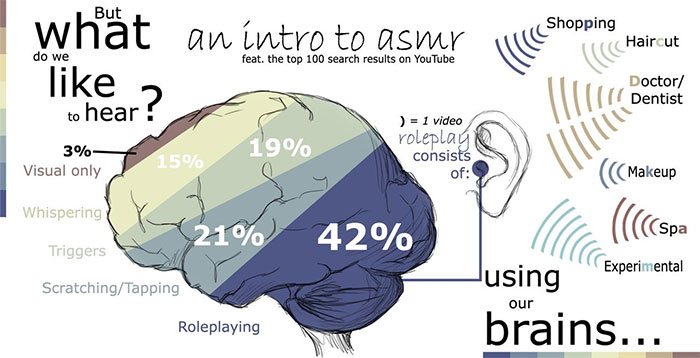ASMR phenomenon - Automatic sensory stimulation
What is ASMR? Surely for you this is a rather strange term.
In fact, more or less of you have experienced this ASMR, which is the feeling when we hear the whispers, stream or chewing food of others. Below, we will explain more about ASMR related matters.

ASMR (short for Autonomous Sensory Meridian Response), is the extreme reaction of controlled sensations . It sounds a little confusing, in fact it's the physical sensations of the body including the tingling sound or an electric current running from the brain to other areas of the body when hearing sounds like whispers, sounds. humming or flipping. Depending on each person, these feelings will make us relax, comfortable, happy or excited. Speaking of which, you probably imagine how this feeling feels .
ASMR stimulation action, divided into 3 categories:
- Tactile stimulation: includes light touch, massage, hair touch, grooming, etc.

- Visual stimulation: Stare, observe other people's hands in motion

- Auditory stimulation: vocal types (eg; soft, whispering, slow, humming, etc.) or mouth sounds (such as chewing, blowing, etc.) or other sounds related to the subject feel (type, scratch, cut, stroke, touch, page flip, type keyboard, etc.). Because those sounds give listeners a familiar, refreshing feeling.

Going into ASMR stimuli to hearing, we would like to specifically describe how it affects the emotions of the brain:
- Whisper: This is one of the most common ASMR stimuli, soothing whispers help calm and relax. Research shows that a simple sound like being associated with slow whispers can help with sleep problems.
- Blow: For example, a bubble blowing produces an effect similar to a whisper. It is like a breeze, can lead you to a good night's sleep.
- The sound of hands tapping on a surface: For example, tapping on a table, wood, glass, etc. it promotes relaxation.
- There are a lot of them out there : the sound of water drops, the sound of chewing gum, the buzzing, the ticking of a clock, the sound of cats calling, etc.
How does it work?
Many people describe the tingling sound or electricity running along the spine. Scientists also hypothesized that the brain receives these signals as a way to trigger the brain's pleasure response.

A study published in PeerJ 2015 found that ASMR could lead to a short-term improvement in symptoms of chronic headache and depression. Participants in ASMR experience showed a significant increase in their positive emotions and social connection.
However, ASMR is not completely effective for all of us. There are people who will feel the immediate response. But others take time to feel it happen to them. It is due to the neurological diversity of humans.
In this regard, a lot of research is still underway to further clarify the feelings that people can identify and how they react. The role and importance of happy hormones: endorphins, dopamine, oxytocin and serotonin on these brain responses.
- Don't be surprised because the ASMR phenomenon is completely beneficial both physically and mentally
- Listen to the exciting ASMR sounds of experiments and chemical reactions
- 'Brain stimulation' recipes help you work more effectively
- Sensory Fiction - Experience the sensation of the story
- Bracelet stimulates the brain
- Cortical stimulation will enhance memory
- He first launched brain stimulation device for depression
- Technology put straight into the brain type Matrix
- Small appliances help control chronic pain
- Can taste taste affect life?
- The new method of 'freeing' snoring
- Multipurpose automatic fertilizer machine for rubber
 'Fine laughs' - Scary and painful torture in ancient times
'Fine laughs' - Scary and painful torture in ancient times The sequence of numbers 142857 of the Egyptian pyramids is known as the strangest number in the world - Why?
The sequence of numbers 142857 of the Egyptian pyramids is known as the strangest number in the world - Why? History of the iron
History of the iron What is alum?
What is alum?